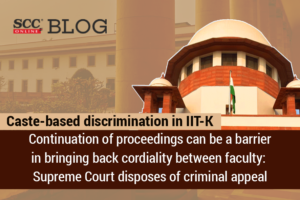Supreme Court: In a criminal appeal against the judgment of Allahabad High Court, wherein the Court quashed the First Information Report (‘FIR’) for the offence under Section 506 of the Penal Code, 1860, Section 66-D of the Information Technology Act, 2000 and Section 3(2)(va) of the Scheduled Castes and Scheduled Tribes (Prevention of Atrocities) Act, 1989., the division bench of Surya Kant and J.K. Maheshwari, JJ. viewed that the continuation of the criminal proceedings will be an impediment to restoration of normalcy and bringing cordiality back between the appellant and the respondents in their professional and personal capacities. Thus, it disposed of the appeal and all pending application
In the case at hand, the appellant is an Assistant Professor in the Department of Aerospace at the Indian Institute of Technology, Kanpur, U.P. He has been commendably pursuing his academic career and was awarded a Ph.D. Degree in recognition of his excellence in the field. However, some unwarranted complaints were made questioning the originality of his Ph.D. thesis, because of which the Senate Post Graduate Committee recommended withdrawal of the Ph.D. thesis and re-evaluation of a revised version of the thesis. The Board of Governors approved those recommendations. Eventually, the matter was referred to a committee of three technical experts which vide their Report concluded that the appellant’s thesis had referred to material which was common knowledge in that specific field of study and advised that a brief corrigendum may be appended to the thesis clearly identifying the texts which referred to points that were common knowledge. The appellant accepted those recommendations and issued a Corrigendum, which was also accepted by the Board of Governors.
However, the faculty members including the respondents were allegedly criticizing the originality of his Ph.D. thesis, besides purportedly making certain remarks which hurt the sentiments, prestige and dignity of the appellant. Thus, the appellant lodged the said FIR.
The respondents denied their alleged role, directly or indirectly, in relation to any doubts which may have been created regarding the appellant’s Ph.D. thesis or any type of social humiliation inflicted upon him. Further, they have sincerely undertook that in the future, they will never do any such thing, or make any comments, which may hurt the sentiments and feelings of the appellant in any manner.
The Court said that the appellant and the respondents are faculty members in one of the premier institutes in the country. Their day-to-day conduct must be exemplary as the students of the institution follow in their footsteps. There is a solemn responsibility on them to ensure that none of their actions should downgrade or demean the institution of renowned academicians who still enjoy the highest respect in our society. The -said allegations in a way, damages the reputation of individuals as well as the institution. Therefore, the appellant as well as the respondents must ensure that they work together as a team in the best interests of the institution and their students, and do not allow any unfortunate and untoward incidents to occur which might hurt the sentiments, feelings, respect and dignity of each other.
Thus, it disposed of the appeal and all pending applications.
[Subrahmanyam Saderla v Chandra Shekhar Upadhyay, 2023 SCC OnLine SC 191, decided on 14-02-2023]
Advocates who appeared in this case :
For Petitioners: Senior Advocate Ashok K. Gupta, Advocate-On-Record Sunita Sharma, Advocate. Nishi Prabha Singh, Advocate Abhishek Gupta, Advocate Ikshita Singh, Advocate Kapil Raghav, Advocate Dishant Bhati, Advocate Tanya;
For Respondent: Senior Advocate Siddharth Luthra, Advocate Prashant Kumar, Senior Advocate Avneesh Tripathy, Advocate-On-Record Smarhar Singh, Advocate-On-Record Ankit Goel.

